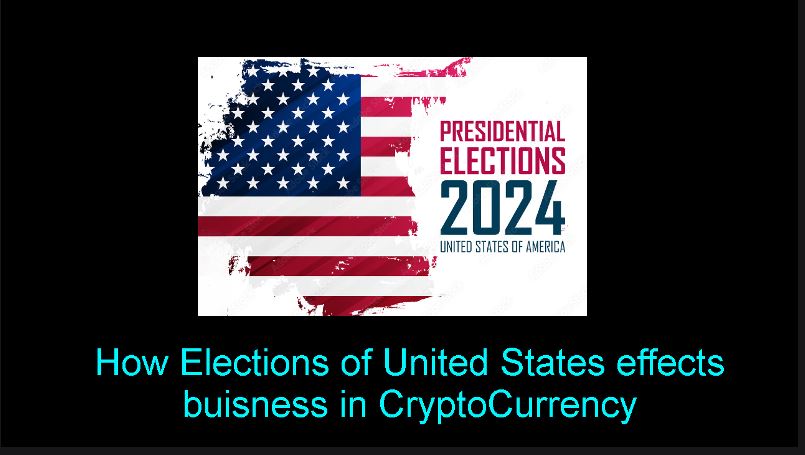Cryptocurrency, regularly heralded because the future of finance, operates at the intersection of era and economics. However, its destiny is likewise intently tied to the political panorama, particularly within the United States. US elections, from presidential to congressional races, wield enormous affect over the cryptocurrency marketplace. They shape regulations, power marketplace volatility, and signal the authorities’s stance on blockchain innovation.
As the 2024 elections unfold, crypto stakeholders—from buyers to entrepreneurs—are carefully looking. Understanding the relationship among US elections and cryptocurrency is critical to navigating this dynamic panorama.
The Intersection of Politics and Cryptocurrency
The cryptocurrency market flourishes on innovation and decentralization, but its lifestyles is a ways from apolitical. Policies enacted with the aid of elected officers at once impact the crypto zone. These variety from regulations addressing blockchain technology to broader economic regulations affecting the fee of virtual belongings.
Elections serve as a turning point, with new management potentially introducing contrasting techniques to crypto oversight. For instance, a pro-regulation administration might prioritize purchaser protections, while a seasoned-innovation government ought to suggest for reduced regulatory obstacles.
Elections and Market Volatility
Election years regularly bring heightened market uncertainty, and cryptocurrency is not any exception. Crypto property, recognized for his or her volatility, are in particular sensitive to political activities that affect financial policy. The anticipation of new regulatory frameworks, modifications in taxation, or maybe public sentiment shifts can cause drastic marketplace fluctuations.
Key drivers of volatility at some point of election intervals encompass:
- Speculative buying and selling: Investors react to perceived risks and opportunities tied to political changes.
- Regulatory uncertainty: Delays in policymaking create ambiguity for crypto agencies and buyers.
- Media narratives: Headlines approximately ability rules or economic shifts extend marketplace actions.
Impact of Regulatory Changes
Regulations are pivotal to the cryptocurrency environment, dictating the whole thing from operational compliance to investor protections. Election outcomes often reshape the regulatory landscape, influencing the trajectory of crypto groups.
For example, federal organizations just like the Securities and Exchange Commission (SEC) and the Commodity Futures Trading Commission (CFTC) play critical roles in defining crypto’s felony barriers. Election consequences can alter their leadership and coverage priorities.
Presidential Influence on Crypto Policy
The president sets the tone for national crypto guidelines through govt orders and agency appointments. Past administrations have taken varied strategies, starting from laissez-faire attitudes to competitive crackdowns on digital assets.
- Obama Administration: Introduced foundational discussions on blockchain’s capacity.
- Trump Administration: Focused on enforcement against fraudulent crypto sports.
- Biden Administration: Emphasized regulatory readability, specifically through groups just like the SEC.
Congressional Elections and Cryptocurrency
Congress holds the legislative electricity to create complete cryptocurrency laws. Congressional elections decide which birthday party controls the time table, impacting tasks which include stablecoin law and blockchain investment.
Election Results and Crypto Markets
The aftermath of elections regularly brings immediately market reactions. Investors interpret results as alerts of destiny regulations, main to shifts in marketplace capitalization, buying and selling volumes, and funding inflows.
FAQs
How do US elections effect cryptocurrency regulation?
Election consequences have an effect on the management and priorities of regulatory corporations like the SEC, shaping compliance requirements for crypto agencies.
Why does the crypto market enjoy volatility at some stage in elections?
Political uncertainty ends in speculative trading, regulatory ambiguity, and fluctuating investor self assurance, all of which extend marketplace volatility.
What position does Congress play in cryptocurrency coverage?
Congress drafts and passes laws that establish the prison framework for cryptocurrencies, along with taxation and anti-fraud measures.
How do presidential policies affect crypto innovation?
Presidential administrations affect crypto innovation thru govt orders, federal investment, and management appointments in applicable agencies.
Will the 2024 elections favor cryptocurrency increase?
The solution depends on the elected management’s stance on innovation, regulation, and taxation, which can be but to be absolutely mentioned.
How do global buyers view US election affects on crypto?
Global stakeholders display US elections for cues on policy shifts that could have an effect on global exchange and regulatory standards.
Conclusion
US elections are a linchpin in determining the destiny of cryptocurrency companies and markets. From regulatory shifts to market volatility, political consequences shape the industry’s trajectory in profound ways. As the landscape continues to evolve, stakeholders need to stay knowledgeable and adaptive to navigate the opportunities and demanding situations posed through the intersection of politics and cryptocurrency.

